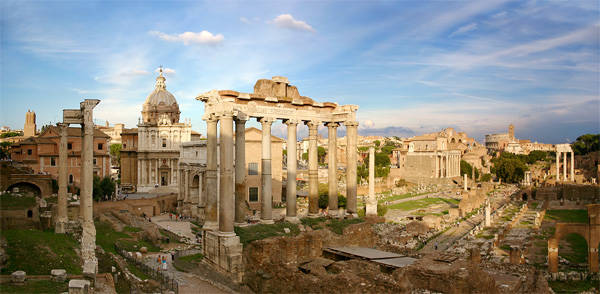Warrior Archaeologists on the March
ROME – At a crowded press conference in Rome Friday over one hundred angry archaeologists met to protest a government campaign denigrating popular sites like the Roman Fora, the Palatine Hill, Ostia Antica and Pompeii as dirty, dangerous and degraded. In addition, some opponents of the government plan are threatening symbolic sit-in’s that in theory could interrupt tourist visits to the most popular archaeological sites.
For months the media message about an archaeological emergency has been hammered away by the foreign as well as the local press (the New York Times, for one, picked up the story). Given the declared emergency, more recently Culture Minister Sandro Bondi announced that the government will appoint a special commissioner cum inspector and, with him, a new oversight committee, bypassing the present bureaucratic structure.
Given the extent of the proclaimed archaeological emergency, Bondi’s choice has fallen on the national director of Italy’s Civil Protection department, Guido Bertolaso, to guarantee the visitors’ pleasant and safe visits to the sites. Bertolaso is a former medical doctor whose normal responsibilities include dealing with earthquakes, forest fires and the still unresolved Naples rubbish emergency. Because Civil Protection falls under the bureaucratic bailiwick of the Council of Ministers, Bertolaso answers directly to Premier Silvio Berlusconi. If and when the proposals are formalized, Bertolaso would be flanked in Rome by a local Roman politician, Marco Corsini, who is city commissioner for urban affairs.
The reorganization would effectively whisk the country’s primary archaeological sites from control by their present directorates. Among the protesters were museum directors, professors, politicians, directors of cultural associations (Italia Nostra was one), the former editor-in-chief of Il Messagggero daily and a number of archaeocrats willing to risk their jobs to denounce what they called a manipulated “fictitious creation of an emergency.”
This is far more than a picturesque battle between soft-headed intellectuals and pointy-penciled politicoes. Parliamentarian Walter Tocci complained that when a hearing was to be held on the question, the government did not bother to show up. “There is no justification for appointing a special commissioner,” Tocci said. “There is no situation that would call for civil protection authorities to intervene. What’s going on is that they simply want to privatize the archaeological parks.”
Indeed, looming in the background is privatization of archaeological sites and their exploitation, which some observers see as the way forward and others, as heretical and in outright conflict with the Italian constitution; indeed plans are underway to take the issue to Italy’s high court, the Corte Costituzionale. In the worst possible case the reorgnization is the thin end of the wedge and could lead, in park areas, to construction projects, hotels, swimming pools, night clubs, and Disney-style theme parks. “The plan is in fact part of the spoils system,” one irate archaeologist claimed.
On the other hand, the 72-year-old archaeologist Andrea Carandini, whom Bondi has already named to head the future oversight committee with Bertolaso and Corsini, is an ardent supporter of the emergency measures. Carandini says that climate change has made the Palatine Hill “fragile” and hence in need of swift emergency action which only the proposed joint city-state can guarantee. “Ancient Rome is a sinking ship,” Carandini told an Italian journalist, adding that the evidence is in the decline in tourist visits to the Roman Forum.
The protesters at the assembly were not buying Carandini’s nor Bondi’s arguments. For one thing, if tourism is down in the Roman Forum, it has risen drastically at Ostia Antica despite a general decline in tourism in Rome as in all Italy due in part to complex reasons, beginnning with the worldwide economic crisis. In addition, as one of the speakers Friday said, “The proposal risks de facto privatization.” Others spoke of the “pseudo-reforms” of recent years and the government’s hacking away of the Culture Ministry’s budget—and then denouncing the bureaucrats for not doing enough to maintain the sites.
Behind the scenes the scuttlebutt is that Minister Bondi will shortly leave the Culture Ministry to return to his old job of promoting the political party created by Berlusconi, Forza Italia. A possible successor: rightist Senator Gaetano Quagliarello, recently in the news for his protest that Eluana Englaro, the woman in a coma for seventeen years, was “killed” by the doctors who let her die earlier this month.
To learn more on both sides of this story, see the Carandini interview and an article on the protest by Edoardo Sassi, Corriere della Sera, Feb. 21, 2009.
At patrimoniosos.it readers can sign a petition in English being circulated against the nomination of a “special inspector” for the Archaeological Sueprintendencies of Rome and Ostia.





































i-Italy
Facebook
Google+
This work may not be reproduced, in whole or in part, without prior written permission.
Questo lavoro non può essere riprodotto, in tutto o in parte, senza permesso scritto.